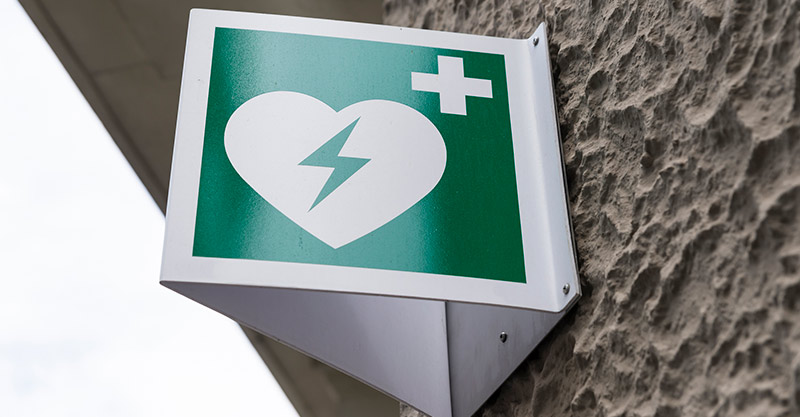Is your facility in compliance with the New Jersey PAD Law?
While many New Jersey companies have heard of the NJ Public Access for Defibrillation Law, there is still some confusion about what it means or how to be in complete safety compliance. If your site has an AED, it is essential to make sure that you have CPR training, as well as a fully active NJ AED compliance program. While AEDs are easy to use, it is crucial to have a team in place that has been adequately trained and certified in CPR and AED.
While it might seem like a good idea to send a couple of employees to the local CPR class to become certified, a more effective route to consider is to have your entire staff prepared to respond to a cardiac crisis. A decision to have your CPR/AED training at your New Jersey business location will help prepare your employees for a team emergency response. At EMC CPR & Safety Training, we bring the classroom to you.
Learning how to perform CPR is quite simple with a skilled NJ CPR instructor. We can provide training at your location to let your staff know what emergency steps to take in the environment in which they are expected to respond. In addition, we can ensure that you are in full compliance with the NJ PAD Law, including the proper CPR certification and complete AED management and oversight.
To inquire about a CPR/AED business training package, submit an inquiry online to call us at 800-695-5655.
Please see below to read the complete NJ PAD Law.
New Jersey Public Access for Defibrillation (PAD) Law
Assembly, No. 2321 (Second Reprint)
An Act concerning certain emergency medical services and supplementing Title 2A of the New Jersey Statutes.
Be It Enacted by the Senate and General Assembly of the State of New Jersey:
1. The Legislature finds that more than 350,000 Americans die annually from out-of-hospital sudden cardiac arrest. Many die needlessly because lifesaving defibrillators are not immediately available. The American Heart Association estimates that almost 100,000 deaths could be prevented yearly if defibrillators were more widely available to designated responders.
Many communities in this State have invested in 911 emergency telephone equipment, ambulances, and the training of emergency personnel. Not all emergency personnel, however, have been trained in or have immediate access to defibrillators. The Legislature intends to encourage the more excellent acquisition, deployment, and use of automated external defibrillators by trained personnel throughout this State.
2. As used in this act:
“Automated external defibrillator” or “defibrillator” means a medical device heart monitor and defibrillator that:
a. Has received approval of its pre-market notification filed pursuant to 21 U.S.C. §360 (k) from the United States Food and Drug Administration;
b. Is capable of recognizing the presence or absence of ventricular fibrillation or rapid ventricular tachycardia and is capable of determining, without intervention by an operator, whether defibrillation should be performed; and
c. Upon determining that defibrillation should be performed, it automatically charges and requests delivery of an electrical impulse to an individual’s heart.
3. A person or entity that acquires an automated external defibrillator shall:
a. Ensure that any person, before using that defibrillator, has completed 1[a nationally recognized training program] and holds a current certification from the American Red Cross, American Heart Association, or other training program recognized by the Department of Health and Senior Services1 in cardio-pulmonary resuscitation and use of a defibrillator;
b. Ensure that the defibrillator is maintained and tested according to the manufacturer’s operational guidelines;
c. 1[Provide for supervision of persons using the defibrillator by a licensed physician to ensure compliance with the requirements of this section; and]
d. 1 Notify the appropriate first aid, ambulance or rescue squad, or other appropriate emergency medical services provider that the person or entity has acquired the defibrillator, the type developed, and its location; and
d. Before purchasing the automated external defibrillator, provide the licensed prescribing physician with documentation that the person or entity buying the defibrillator has a protocol to comply with subsections a., b., and c. of this section1.
4. a. A person shall not use a defibrillator unless he has completed 1[a nationally recognized training program] and holds a current certification from the American Red Cross, American Heart Association, or other training program recognized by the Department of Health and Senior Services1 in cardio-pulmonary resuscitation and use of a defibrillator; provided. However, this section shall not apply to a person licensed as a paramedic, emergency medical technician-D, or a first responder-D by the Department of Health.
b. Any person who uses a defibrillator shall request emergency medical assistance from the appropriate first aid, ambulance, or rescue squad as soon as practicable.
1[c. Any person who uses a defibrillator shall report the use of that device to the supervising licensed physician appointed under subsection c. of section 3 of this act.]
5. a. Any person or entity who, in good faith, acquires or provides a defibrillator, renders emergency care or treatment by the use of a defibrillator or supervises such care or treatment and, who has complied with the requirements of this act, shall be immune from civil liability for any personal injury as a result of such care or treatment, or as a result of any 1[act or failure to act in providing or arranging further medical] acts or omissions by the person or entity in providing, rendering or supervising the emergency care or1 treatment.
b. The immunity provided in subsection a. of this section shall include the 1[supervising licensed physician and the] 1 2prescribing licensed physician and the2 person or entity who provided the training in cardio-pulmonary resuscitation and use of the defibrillator.
c. This subsection shall not immunize a person for any act of gross negligence or willful or wanton misconduct. 1 It shall not be considered gross negligence or willful or wanton misconduct to fail to use a defibrillator in the absence of an otherwise preexisting duty.


